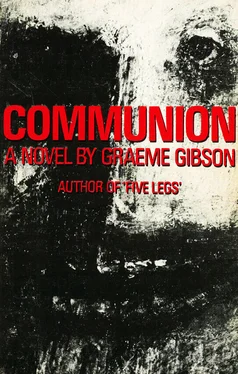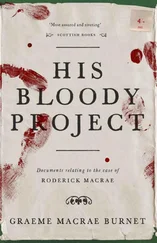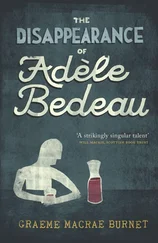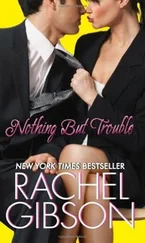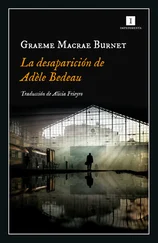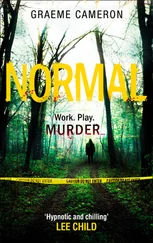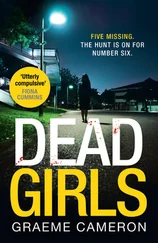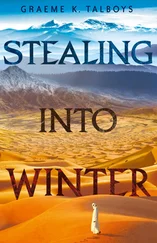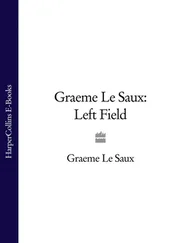Graeme Gibson - Communion
Здесь есть возможность читать онлайн «Graeme Gibson - Communion» весь текст электронной книги совершенно бесплатно (целиком полную версию без сокращений). В некоторых случаях можно слушать аудио, скачать через торрент в формате fb2 и присутствует краткое содержание. Город: Toronto, Год выпуска: 2012, ISBN: 2012, Издательство: House of Anansi Press Inc., Жанр: Современная проза, на английском языке. Описание произведения, (предисловие) а так же отзывы посетителей доступны на портале библиотеки ЛибКат.
- Название:Communion
- Автор:
- Издательство:House of Anansi Press Inc.
- Жанр:
- Год:2012
- Город:Toronto
- ISBN:978-1-77089-346-7
- Рейтинг книги:5 / 5. Голосов: 1
-
Избранное:Добавить в избранное
- Отзывы:
-
Ваша оценка:
- 100
- 1
- 2
- 3
- 4
- 5
Communion: краткое содержание, описание и аннотация
Предлагаем к чтению аннотацию, описание, краткое содержание или предисловие (зависит от того, что написал сам автор книги «Communion»). Если вы не нашли необходимую информацию о книге — напишите в комментариях, мы постараемся отыскать её.
The narration proceeds in haunting rhythms which make it mesmerizing reading. By the end, they rise to a harrowing and purgative intensity.
Communion — читать онлайн бесплатно полную книгу (весь текст) целиком
Ниже представлен текст книги, разбитый по страницам. Система сохранения места последней прочитанной страницы, позволяет с удобством читать онлайн бесплатно книгу «Communion», без необходимости каждый раз заново искать на чём Вы остановились. Поставьте закладку, и сможете в любой момент перейти на страницу, на которой закончили чтение.
Интервал:
Закладка:

Ritson awakens. It’s predictable enough. This afternoon, like every afternoon at the same time, the need to urinate wakens him. Since he’s not yet prepared to wet himself, he can resist the pressure but he can’t ignore it. So he wakes up. Manoeuvring onto his back, he opens his eyes. There is no light, not a glimmer, he’d be astounded if there were. Lying on a mattress, in a windowless cubicle, not a cell, in the deepest corner of his basement, he acknowledges there is light in the city, but it never penetrates this far beneath the street.
On his back in the dark, it’s like sleep but his eyes are open, the empty house above him, so many rooms, the furniture covered with sheets to protect it, he remembers a woman, she must have done that before she left. Or has he always been alone? He remembers many women, and children, some of them had children in their arms, they prepared meals of soup and sandwiches for children coming home from school. It doesn’t matter. He must get up, the pressure on his bladder insists, he closes his eyes, he opens them again. Children skating on a river, their red toques brilliant in the sun. Their voices come to him in the wind. It’s possible he played a musical instrument of some kind, a violin perhaps, some instrument that he could carry with him.
He’s convinced, not without reason, that he’s appreciably weaker, his body less effective. The pain is no more intense, indeed it may have diminished, but that’s neither here nor there; pain has come and gone with the brute regularity of the tides for as long as he can remember. Inevitable; but it has no more bearing on his true state than the beating of his heart, for example, or the alternate expansion and contraction of the lungs inside his chest. But when he attempts to stand he can see that the process of disintegration in his body has continued while he slept, it may even have accelerated. His spine doesn’t bend easily, it’s as though the individual vertebrae cling to each other and even with help from his arms, the muscles in his belly are incapable of pulling him into a sitting position. He rolls onto his side, drawing his knees up to his chest, levering with his arms, he flops onto his belly, he struggles to raise his trunk from the mattress, to rise onto all fours, his arms are too weak, he collapses, his face bangs rudely against the cellar floor. It’s probably like this every day, soon the strength will return, he lies motionless with one arm beneath him, his face is pressed against the cement.
If he doesn’t manage to get up soon he’ll have to pee here in his bed and he’s never done that before, at least he can’t believe he has. He has vomited, that’s fairly certain, he’s clawed himself from sleep, his throat and lungs choked with half-digested food, and in the past, dreaming of boys and girls, a hayride perhaps, young limbs entwining him, their voices, hands, the smell of the hay, their bodies, he’s woken with hands between his legs, the unfamiliar noise of ecstasy. If it happened, it was a long time ago.
Manoeuvring onto his back, he opens his eyes. On his back in the dark, it’s like sleep, the empty house above him, so many rooms, the furniture covered with sheets to protect it, he remembers a woman, she must have done that before she left. Or has he always been alone? He remembers many women, and children, some of them had children in their arms, they prepared meals of soup and sandwiches for children coming home from school. It doesn’t matter. He must get up, the pressure on his bladder insists, he closes his eyes, he opens them again. Children skating on a river, their red toques brilliant in the sun. Their voices come to him in the wind.

Felix stops by the car, he’s afraid, he turns to look at the corpse. Even if he did kill it, it doesn’t matter: beneath stars, the dead of winter, no harmonies, there’s nothing known, nothing not known; he’s trembling against the car, the occasional naked tree, the brittle earth, he doesn’t tremble because of the fear, not even because of the cold.
What does he have to do?
Deathly cold, shaken by uncontrollable tremors, he drives back down along the road they entered. Snowbanks on either side, he accelerates beneath the sky. It was dead when he revived, beside him, nestled against him, its great body against him: he had stumbled away from the black snow, he had paused . . . Descending to the lake he turns to the right, the heater is beginning to thrust warm air into the car, it isn’t enough. He failed. He doesn’t understand. The road rises and falls with the land, he passes houses without lights clustered at crossroads.

Leaving by the side door, into the alley, it’s dark, he’s wearing running shoes and goes directly to the park, then into the ravine, he moves with empty grace, through underbrush, a path beside the road because sometimes there are others . . .
Under the railway bridge, he smokes a cigarette: cupping it secretively in his hand, he hunches down with his back against the concrete column. He listens to the stream rushing over rocks and garbage. It stinks of the graveyard. There was a boy who lived under a bridge, maybe even this bridge, there are lots of places to hide, he grew up under it in the middle of the city and nobody knew he was there. He’d come out at night to forage for food like the raccoons. He would have gone to the country, it might have been different in the country, but he didn’t know it was there. During the day he’d cling unmoving among the supports high above the ravine and watch strangers walking dogs, he was afraid of the dogs, he saw boys and girls playing together, riding their bicycles; occasionally there would be lovers lying together in the long grass, he’d see them, their private urgency and after they’d gone he’d descend to where their bodies had crushed the grass and lying on his belly, with a long freight rattling over the bridge above him, he’d weep. He knows how the rabbits move nervously at dawn and where the groundhogs live, he’s seen them killed by dogs.
At night, when there’s no longer the noise of traffic on Yonge Street, with winos sleeping heavily in the bushes, he emerges from the ravine, he must eat and knows which houses are likely to be open and where there are no dogs. He’s motionless by the catalpa, he’s watching, listening, then he vaults the fence and moves quickly to the back door and slips inside. He’s selective by instinct and rather than have them miss anything, begin to watch for him, he’ll visit three or four houses, taking a little from each. He drinks from the milk bottle, there’s cold meat in a drawer beneath the freezer, he takes some fruit, several slices of bread, he puts it all in his pockets, picks up a tomato, takes another mouthful of milk and starts for the back door . . .
Excited because nobody knows he’s here, there are lights in the apartment window, but he can’t see anybody inside. Music is playing somewhere, he doesn’t recognize the song: noise from the traffic on Yonge Street is curiously soothing, like the sea. Using the fence and the tree, Fripp climbs onto the garage roof, he wriggles forward on his belly, excited because nobody knows he’s here, he presses himself flat on the gravelled surface. A bearded man appears in the window, it’s the husband, he stands looking out with a drink in his hand. There is a bed behind him, a doorway with light in it; the music has stopped. Night air is moving imperceptibly against his face as she appears in the doorway, the woman walking up behind him, she puts her arms around him, he doesn’t move, her hand is inside his shirt. If they speak he cannot hear them, if there are sounds in the apartment, he doesn’t know: they remain motionless, he imagines their breath, the rustle of clothing as he eventually turns to her. He takes her in his arms. She turns from him, he reaches after her, she stops to look at him from the doorway, his arm is still extended, she steps forward and sits on the bed, she’s reflected in a mirror on the wall, she lies with her face in her hands, the man walks to stand over her, he touches her as if he’d never seen her before. She doesn’t move. He touches her shoulder and still she doesn’t move, he’s saying something to her; she presses her face even more tightly into her hands. The man comes to the window. He empties his glass and lights a cigarette, he stands smoking, staring out at the end of the garden. Without turning his head he says something, the woman raises her face to stare at him, her long hair over her face like a mask: it isn’t any good, the man turns, the woman stands, pulls her dress up her body and over her head, she is naked except for bikini pants and her back is crisscrossed with lacerations as if she has frequently been whipped. He sees her reflected in the mirror, she is standing very still, her body is white and soft even from this distance, her breasts are heavy. He does not know what is happening, the expectation is like panic. She bends to the bed, she kneels on it, she stretches herself face down along it, the man comes to crouch over her, he leans to put his mouth on her wounds, they look like decorations in her flesh, his tongue traces them dutifully, there’s no passion, they don’t appear to be moving at all. Her eyes are closed.
Читать дальшеИнтервал:
Закладка:
Похожие книги на «Communion»
Представляем Вашему вниманию похожие книги на «Communion» списком для выбора. Мы отобрали схожую по названию и смыслу литературу в надежде предоставить читателям больше вариантов отыскать новые, интересные, ещё непрочитанные произведения.
Обсуждение, отзывы о книге «Communion» и просто собственные мнения читателей. Оставьте ваши комментарии, напишите, что Вы думаете о произведении, его смысле или главных героях. Укажите что конкретно понравилось, а что нет, и почему Вы так считаете.
